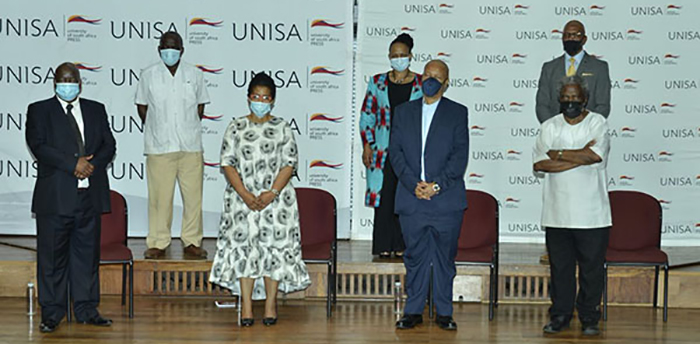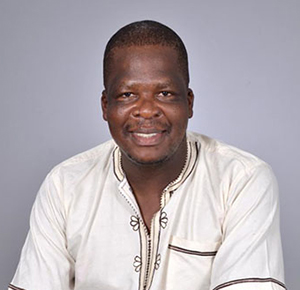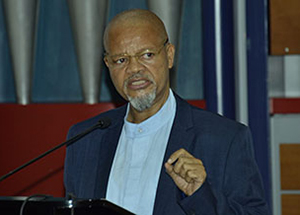
It was a day dominated by reflection on and appreciation of the leadership qualities of former Unisa Principal and Vice-Chancellor (VC), Prof Mandla Makhanya, as the university launched his book on 19 March 2021. Entitled Making an African university in the service of humanity: Professor Mandla Makhanya’s speeches, it is a volume of his carefully chosen speeches that, among others, highlight what it means to be an African university.

Front, from left: Abbey Makoe (Editor of the book), Prof Puleng LenkaBula (Principal and Vice-Chancellor, Unisa), Prof Mandla Makhanya (former Principal and Vice-Chancellor, Unisa) and Prof Muxe Nkondo (Unisa Council member and Editor)
Back, from left: Prof Harry Nengwekhulu (former Director of the School of Governance, Unisa), Prof Thenjiwe Meyiwa (Vice-Principal: Research, Postgraduate Studies, Innovation and Commercialisation, Unisa) and Dr Meiya Nthoesane (Director: Unisa Press)
In her opening and welcoming remarks, Unisa’s Principal and Vice-Chancellor, Prof Puleng LenkaBula, said: "This is an auspicious occasion wherein we celebrate the contributions to the knowledge arena through publication of an important book, which marks the historical milestone and processes that Prof Makhanya has equipped us with." She added: "It is not only a chronicle of a personal journey but is the former VC’s account of his contributions to shaping the biggest and most impactful university."

Prof Sabelo Ndlovu-Gatsheni (Keynote speaker and Chair: Epistemologies of the Global South University of Bayreuth: Germany)
Appreciating his contribution to the knowledge arena, LenkaBula remarked that the book reflects a sense of completion of a job loyally and faithfully well done by Makhanya. "We must therefore express our warm collective congratulations and appreciation, for the sheer amount of hard work and effort applied in keeping the hand on the tiller of this huge ship, Unisa," said the VC.
While Makhanya had delivered many more speeches and addresses to the Unisa community, the country and the global arena, LenkaBula acknowledged: "You have carefully selected those speeches which you felt spoke to the imperative of building knowledge communities, for epistemic communities are necessary in building countries, continents and institutions. But, more so, for the intellectual formations of new and younger generations that need to understand the value and role of higher education as a progressive aspect of ensuring transformation, development, assertion of people’s humanity, people’s dignity and the right to being human."
The keynote address was delivered by Prof Sabelo Ndlovu-Gatsheni, Chair in Epistemologies of the Global South University of Bayreuth in Germany. For him, one of the most outstanding features of the book was its title. Here, Ndlovu-Gatsheni emphasised three important terms, one of which was the African university. He said: "Professor Makhanya was clear as to which direction he was re-making Unisa from a university in Africa into an African university."
"The sheer volume of the speeches and diversity of their subjects and themes, give us a picture of a very active, engaging and communicative leader, not shy of the podium, and a voice that was never muted, but always loud and clear on pertinent issues relating to the making of Unisa into an African university in the service of humanity," said Ndlovu-Gatsheni.
Ndlovu-Gatsheni also lauded Makhanya for boldly raising his voice about the pertinent issues of decolonisation, ranging from scholarship and epistemology, to gender-based violence (GBV), racism, sexual harassment and rehumanisation of the dehumanised as a central leitmotif of transformation.
One of Makhanya’s speeches that stood out for Ndlovu-Gatsheni was delivered in 2011 at the official opening of the academic year, which spoke to service to humanity and timeless values - the 11 Cs+1, which include communication, community and collegiality. He said: "Your book will be a reference point on leadership. The leadership taking over from you is blessed to get this gift." He concluded: "You played your part. Publishing your speeches is an act of courage and openness to public engagement. You have set the bar high for us."
The programme, directed by Dr Meiya Nthoesane, Director of Unisa Press, had an interactive session with prominent speakers: Prof Mandla Makhanya; Prof Harry Nengwekhulu, former Director of the School of Governance, Unisa; Prof Muxe Nkondo, Unisa Council member and editor; and Abbey Makoe, co-editor of the book.

Prof Mandla Makhanya says at the core of a journey is a strategy.
Makhanya expressed gratitude for the support he got from, among others, the Unisa Council, Unisa Press and Unisa’s patron of the Thabo Mbeki African School of Public and International Affairs and Unisa Chancellor, HE Thabo Mbeki, who put together the foreword of the book. He reflected on his tenure at Unisa and the interactions that were held with the then and current Unisa Council.
Makhanya said he had been committed to building a new DNA in a university that would actually bring about what would be viewed as a culture of academic excellence, service to the stakeholders, as well as the efficiencies and effectiveness of the work that they had to do, with an understanding of building an agile and high performing institution of higher learning.
"At the core of the journey was the strategy, which was the anchor. It assisted us to drive the transformation agenda that has helped us to build this institutional ethos within the institution, and the institutional culture, which was then underpinned by the 11 Cs+1," said Makhanya.
Nengwekhulu reflected on the obstacles that were placed before them when they were trying to transform Unisa into an African university. He appreciated Makhanya’s commitment to transform the curriculum and introduce indigenous languages.
Other than praising Makhanya’s strength on African dynamic, African civilisation and identity, Nkondo said: "We need to identify a set of capabilities that the university needs to learn from Prof Makhanya’s wisdom and his memories. We need to work together as Council and with the office of the VC to address the question of institutional learning." He added: "We will have ourselves to blame if we do not learn from the past."
Makoe focused mainly on the manuscript and appreciated how Makhanya kept the memories of the fallen African icons such as Es’kia Mphahlele and Steve Biko alive by hosting memorial lectures at Unisa. He further urged Unisa to be globally competitive as an open distance e-learning (ODeL) institution.
In her closing remarks, the Vice-Principal of Research, Postgraduate Studies, Innovation and Commercialisation, Prof Thenjiwe Meyiwa, said: "In our aspiration and gratitude, we want to continue to drink from this cup of wisdom and legacy of Prof Makhanya, and learn from his leadership, and embrace the mission of an African university in the service of humanity."
* By Nancy Legodi, Acting Journalist, Department of Institutional Advancement
Publish date: 2021-03-24 00:00:00.0